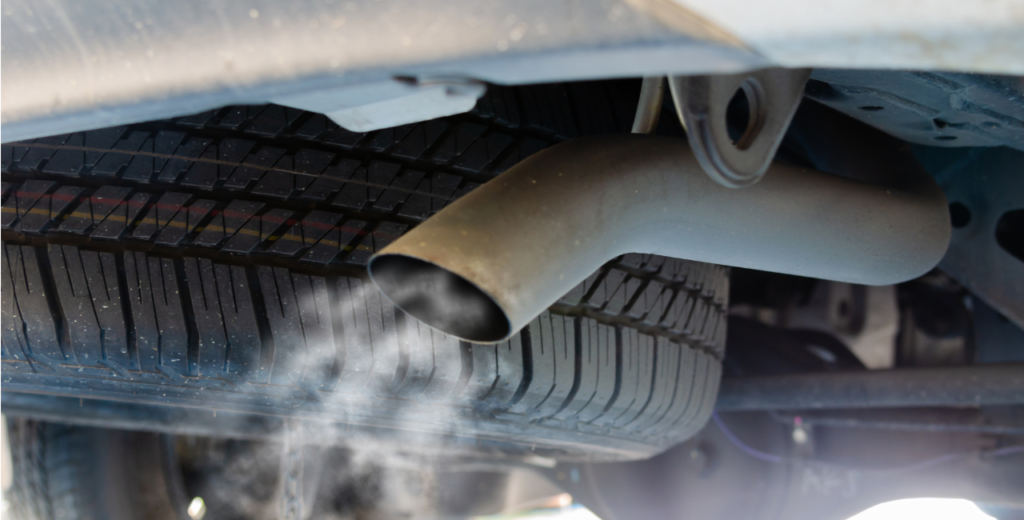An exhaust leak occurs when there is a gap or crack in the exhaust system, allowing gases to escape before they reach the tailpipe. This issue can lead to several serious problems for your vehicle. A leak can reduce fuel efficiency, as the engine may need to burn more fuel to compensate for the loss. It can also negatively impact engine performance, causing acceleration difficulties and power loss. Additionally, an exhaust leak poses health risks, as harmful gases like carbon monoxide can seep into the cabin. If you suspect an exhaust leak, it is crucial to have it inspected and repaired by a professional auto repair shop to ensure your vehicle remains safe and efficient.
Exhaust Leak Symptoms
Recognizing the signs of an exhaust leak early can prevent costly repairs and ensure your vehicle operates efficiently. If you notice any of the following symptoms, it may be time to seek an exhaust system repair service:
1. Loud Engine Noise
- If your car’s engine sounds louder than usual, particularly when accelerating, it may indicate a crack or hole in the exhaust manifold or piping.
- The noise is often described as a hissing or tapping sound, which gets louder with increased engine speed.
2. Decreased Fuel Efficiency
- A leak in the exhaust system can cause your engine to work harder, leading to reduced gas mileage.
- If you notice you’re filling up your tank more frequently without a clear reason, an exhaust leak could be the cause.
3. Poor Engine Performance
- A damaged exhaust system can cause power loss and sluggish acceleration.
- The engine may struggle to maintain speed, especially during acceleration or when driving uphill.
- Performance issues often arise due to an incorrect air-to-fuel ratio caused by the leak.
4. Burning Smell From the Engine Bay
- If you detect a burning odor, especially near the engine bay, it may be due to exhaust gases leaking onto plastic or rubber components, causing them to melt.
- This can also result in visible smoke under the hood in severe cases.
5. Vibrations in the Steering Wheel or Pedals
- Unusual vibrations in the steering wheel, gas pedal, or floorboards could be a sign of an exhaust leak.
- These vibrations result from disrupted airflow in the exhaust system and can worsen as the leak expands.
6. Check Engine Light Turns On
- A leak can interfere with the vehicle’s oxygen sensor readings, causing the Check Engine Light to illuminate.
- It’s crucial to have your exhaust system inspected when this warning appears, as prolonged issues can lead to more significant damage.
7. Strong Exhaust Fumes Inside the Cabin
- Exhaust leaks can lead to carbon monoxide seeping into the cabin, posing a serious health risk.
- If you smell exhaust inside your car, roll down your windows immediately and seek professional repairs to avoid dangerous exposure.
What Causes an Exhaust Leak?
Understanding the causes of an exhaust leak can help you prevent future issues. Here are the most common reasons why leaks develop:
1. Rust and Corrosion
- Over time, moisture and road salt can cause rust, leading to cracks or holes in the exhaust system.
- Vehicles in humid or snowy climates are especially prone to corrosion-related leaks.
2. Loose or Damaged Gaskets
- The exhaust manifold gasket seals the connection between the engine and exhaust system.
- Over time, worn-out or damaged gaskets can break down, allowing leaks to develop.
3. Physical Damage
- Driving over rough terrain, potholes, or speed bumps can cause dents, cracks, or misalignment in the exhaust system.
- Lowered cars are more susceptible to physical damage due to reduced ground clearance.
4. Faulty Exhaust Manifold
- Cracks in the exhaust manifold can allow gases to escape before reaching the catalytic converter.
- These cracks may expand due to engine heat cycles, making early detection crucial.
How to Fix an Exhaust Leak
Depending on the severity and location of the leak, there are several ways to fix the issue:
1. Inspect and Tighten Loose Connections
- Check for loose bolts or clamps at exhaust pipe connections.
- If bolts are missing or damaged, replacing them may restore the seal.
2. Replace the Exhaust Gasket
- A damaged gasket should be replaced to restore a proper seal and prevent leaks.
- It’s important to use high-quality gaskets to ensure longevity and durability.
3. Apply Exhaust Repair Putty or Tape
- For small leaks, exhaust sealants, putty, or tape can provide a temporary fix.
- This is only a short-term solution, and professional repairs should be scheduled soon after.
4. Weld or Replace the Affected Section
- For larger cracks or holes, welding may be necessary to restore integrity.
- In severe cases, replacing the damaged pipe or component is the best solution.
5. Visit a Professional Mechanic
- If you’re unsure about the severity of the leak or how to fix it, take your vehicle to a trusted mechanic for a comprehensive inspection and repair.
Preventing Exhaust Leaks
To avoid future exhaust leaks, follow these preventive measures:
- Regular Maintenance: Schedule routine inspections to detect early signs of wear and tear before they become major issues.
- Avoid Rough Driving: Drive carefully to prevent physical damage to the exhaust system, especially on uneven or debris-filled roads.
- Wash Your Car Frequently: Cleaning the undercarriage helps remove road salt, dirt, and moisture, reducing the risk of rust and corrosion.
- Replace Worn Components: Don’t ignore small leaks, as they can worsen over time, leading to costly repairs.
Get Professional Exhaust Repairs at Eric’s Car Care
Ignoring exhaust leak symptoms can lead to engine damage, increased emissions, and health hazards due to carbon monoxide exposure. If you notice any signs of an exhaust leak, visit Eric’s Car Care for a professional inspection and repair. At Eric’s Car Care, we specialize in exhaust system repairs, ensuring your vehicle runs efficiently and safely. Our expert mechanics use advanced diagnostics and quality parts to fix exhaust leaks quickly and affordably. Don’t let a minor leak turn into a costly repair—schedule your appointment today by calling 713-667-9293!

